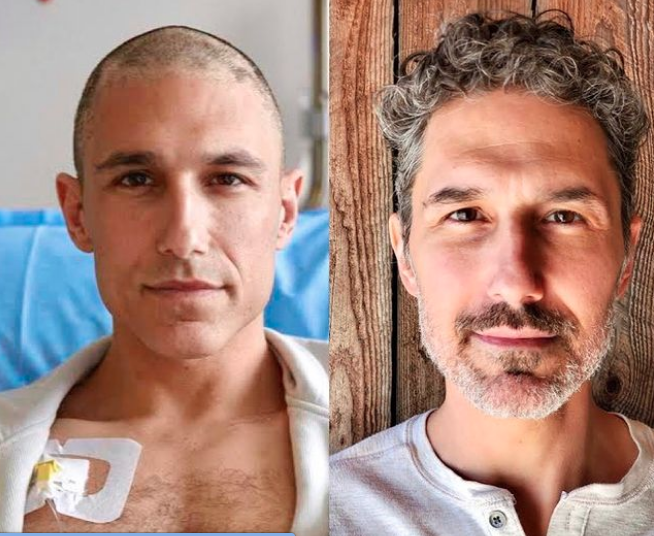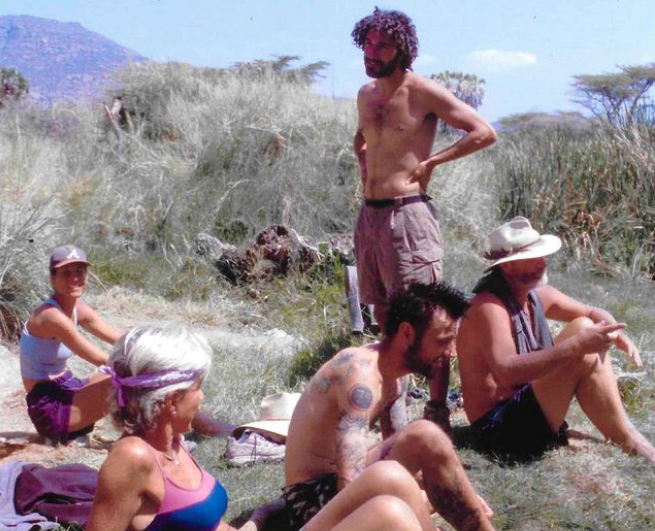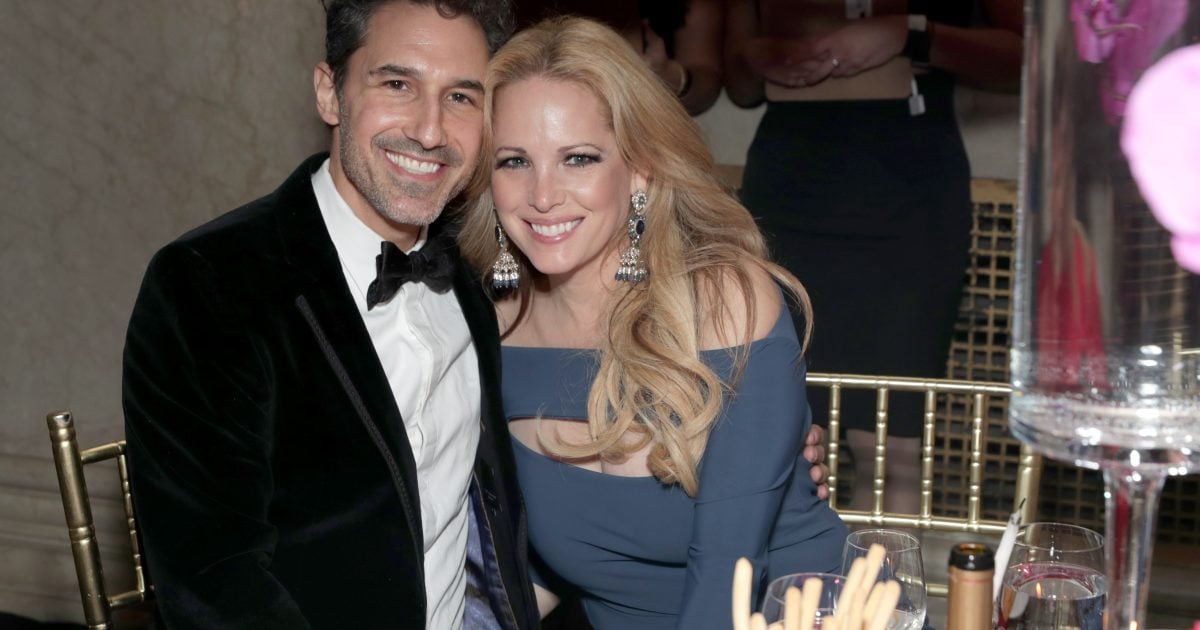Ethan Zohn's New Normal
- Survivor winner Ethan Zohn says that adjusting to life after cancer was the most difficult part of his journey, telling SurvivorNet that dating, in particular, was a ‘minefield.’
- ‘Self-confidence issues, you look horrible, you feel horrible,’ recalls Zohn of how he felt at the time, but he says that all turned around when he began dating his now-wife Lisa.
- Zohn, who twice battled a rare form of Hodgkin’s lymphoma, is now sharing all he learned during his cancer journey as an ambassador for the Lymphoma Research Foundation.
In an interview with SurvivorNet, the former soccer player discusses the importance of getting a second opinion, how his stem cell transplants prepared him for living in isolation during the COVID pandemic, and reveals the most difficult part of his cancer battle.
Read MoreThis is also when patients are surrounded by a team of experts focused on their health and general care.

Brave New World
However, that support system sometimes disappears when a patient beats the disease, and as Zohn explains, they are forced to navigate a bizarre and jarring new world on their own.
“After cancer for me has just been the most difficult part of the journey,” says Zohn.
Of particular difficulty, he explains, is doing all the things that came as second nature before being diagnosed with cancer at the age of 35.
“As a young adult facing a cancer diagnosis and then living in remission, there’s so many, you know, aspects of our journey that differ from pediatrics and older adults,” points out Zohn. “It’s fertility; it’s insurance, it’s getting your job, it’s dating, marriage. All this stuff is going through your mind, and they’re just weren’t that many resources for me to look into.”
This is why Zohn is now teaming up with the Lymphoma Research Foundation to spread awareness about all stages of the cancer journey, hoping that others will not feel as lost as he did after he conquered cancer.
Single and Not in the Mood to Mingle
It was dating that Zohn says was particularly difficult.
“I mean, we can have a whole other interview on dating after cancer because it is just a minefield,” he says. “Self-confidence issues, you look horrible, you feel horrible.”
However, things did not turn out so bad for Zohn, who managed to meet and marry his wife, Lisa, around this time.
The pair started as friends, which made the relationship come together more naturally, but things took a sudden turn once it got serious between the two.
“I remember at that moment I was trying to push her away. I’m like, I do not want to get involved with this; I am a hot mess; please go away. Doing stupid stuff to, you know, destroy a relationship,” recalls Ethan. “And [Lisa] said, ‘Listen, cancer has taken so much from you, don’t let it take this.’ And at that moment, I was like, ‘Alright, I’m in. Let’s do this.’ And, you know, from that point on, obviously we haven’t spent a day apart except [in 2019] when I was competing on Survivor [Winners at War].”
Support System
Zohn says his wife is one of the people who had the biggest impact on his life during his cancer journey.
“I met my wife right before I went into my second stem cell transplant, and we stayed in touch through friends for a really long time,” notes Ethan.
The pair then got together when Zohn says he “was kind of healthy enough and in the right headspace to actually start dating.”
He then adds that he is not the kind of guy most girls wanted to take home to meet the parents at the time.
“Hey, cancer twice, I don’t have a job, I don’t have any insurance, I can’t have kids,” jokes Ethan.

Practicing for Pandemic
Zohn says living in isolation during the COVID pandemic came naturally to him at the time.
“So when the COVID hit, I was like, this is kind of like going through a stem cell transplant, and I was able to navigate the global situation quickly,” says Zohn, who spent a combined 260 days in isolation during his transplant procedures.
Individuals who undergo stem cell transplants are required to stay in a germ free environment with few if any visitors for weeks and in some cases months after the procedure because their white blood cells are too depleted to fight off viruses or infections.
“For me, it’s always been about acceptance like once you accept what’s going on, then you can actually map out how you want to live your life so you know when COVID hit, I looked at my wife and like, how long do you want to go like, what are you willing to sacrifice to stay healthy so we can be alive on the other side of this.”
The two decided to isolate for a year, and Zohn says it was an incredible learning experience.
“I really leaned on all the skills that I learned when I was going through lymphoma and how to be able to connect with people, how to live an isolated lifestyle.”
He also learned to exercise, meditate, and do his daily visualizations without ever leaving his home.
Second Opinions
It is a long way from the moment back in 2011 when Zohn started to think that he might not beat the disease for the first time.
“I went through chemotherapy, radiation, and then I had a stem cell transplant. And the stem cell transplant failed after 20 months. And at this time, I was like: ‘Oh my god. I’m running out of options, I’m pissed off, I’m scared, and I didn’t want to die,'” recounts Zohn. “And this time of my life, this is like kind of when you pray. You pray for a silver lining or a hope, a glimmer of light, all that stuff.”
One of the first things Zohn did after this, he says, is get a second opinion on his treatment options. And then a third, and a fourth.
“I think there’s a lot of some hesitations for patients out there because you know sometimes they’re afraid they’re gonna upset a doctor like they’re cheating on them,” says Zohn about the hesitancy of some patients to get a second opinion. “I learned early on that I had to take the initiative of my own cancer care. So, my first fear was that they would all come back with different kinds of paths to a cure. Lucky for me, they were all in agreement that getting a second stem cell transplant was the right course of action.”
He then had to decide between Dana Farber Cancer Institute in Boston, where doctors wanted to perform the transplant before his cancer had gone into remission, and Memorial Sloan Kettering Cancer Center in New York, where doctors wanted to wait until the disease was at bay.
Zohn ultimately stuck with MSKCC, noting that it also helped that they were based in the city he was living in at the time.
And he did so with peace of mind, having been able to weigh his options.
“I felt comfortable knowing that all these doctors were kind of in agreement with what I needed to do,” explains Zohn.
Now, he will be using his cancer smarts to help others in his role as an ambassador for the Lymphoma Research Foundation. The group will kick things off on September 15 by lighting landmarks in major cities in honor of World Lymphoma Day.
Survivors Who Are Changing the Narrative on Cancer
Much like Zohn, wife, mother, and author Kate Bowler was in her mid-thirties and found herself struggling to adapt to her new life after she was diagnosed with stage IV cancer.
“As a patient, I wasn’t always sure what my job was,” she told SurvivorNet in a previous interview. “As a mom, I know what my job is. I had an almost two year old, and my job was to be safe and to play with toys, and to be really present. And I’ve married my high school sweetheart, and as a wife I knew what my job was; be reasonably cheerful, pay attention during dinner, stuff like that.”
Cancer was not a role that Bowler was equipped to play she says, so she faked it.
“As a cancer patient, I didn’t know what my job was. Is it to be really cheerful, so that people want to take care of me? Is it to be a super Googler, where I know what all my symptoms are? I couldn’t figure out if I was supposed to be an expert, in a way that I knew how to be an expert in my regular life,” explains Bowler, who is a professor at Duke University.
“And so, I bounced a lot back and forth between being a huge liar, just a giant performative ball of cheerfulness. It was like I was starring in a reality show about someone who had cancer and was very enthusiastic about it.”
At the same time, however, there was something much darker going on underneath the surface.
“And then privately, I was so scared. And, I didn’t know how to figure out how scared I should be,” notes Bowler. “So yeah, I felt like I was always bouncing back and forth between those two realities. Outward confidence, inward fear.”
Kate Bowler on Adjusting to Life With Cancer
Bowler is also using her experiences to try and shake things up and spread awareness about how people treat cancer patients, much like Zohn.
“I feel very protective about the people in my life and their experiences with cancer. Not because I don’t think that like in our little bubble of love, that we can’t come up with the right language to say, ‘We’re going to live really beautifully. We’re going to live really meaningfully. We can do this together,'” explains Bowler.
“It’s just, I feel like every time I walk out the door, I’m like scared of what other people will say to them, because everyone speaks in outcomes or certainties. And this is a life beyond certainty. So, I wish there was more language, frankly for everybody, so that they didn’t just say, ‘I heard your mom has cancer.’ Or, What’s her diagnosis?’ All the words I feel like are just going to are just going to hurt them, so it stresses me out.”
Bowler shared these thoughts and others in her book on the subject, Everything Happens for a Reason and Other Lies I’ve Loved.
The Failure of Language With Cancer Patients
Learn more about SurvivorNet's rigorous medical review process.


